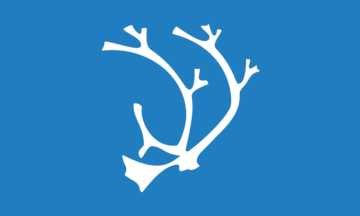 image by Tomislav Šipek, 15 February 2017
image by Tomislav Šipek, 15 February 2017Approved on 2 November 1984.

Last modified: 2025-03-29 by shreyas tallamraju
Keywords: eidfjord | antlers |
Links: FOTW homepage |
search |
disclaimer and copyright |
write us |
mirrors
 image by Tomislav Šipek, 15 February 2017
image by Tomislav Šipek, 15 February 2017
Approved on 2 November 1984.
See also:
Eidsfjord municipality is situated in Hordaland county.
The interior of the county of Hordaland is dominated by the mountain plateau of Hardangervidda,
the population mainly being settled in the lowland along the Hardangerfjord. 90% of the area of
the municipality of Eidfjord is situated 1200 meters or more above the sea level. However,
the community takes its name after the fjord. The importance of the resources
of the mountain region, hunting, is symbolized in the coat of arms by taking the reindeer
antlers as the local emblem. On the flag, the antlers appear in white on a field of blue.
The antlers represent strength and growth, but the pattern of the antlers can also be understood
as representing the rivers flowing from the mountains towards the fjord. The flag was designed
by John Digernes and was officially approved 2 November 1984. When I last checked with the
municipality, no flag had been made. However, the antlers, together with the name of the
municipality, flew day and night on pennants at the municipal building.
Source: The text and image are based on research Engene did for an article published
in the German vexillological journal Der Flaggenkurier, No. 2, 1996 [joe96].
Consult this article for detailed references to sources.Jan Oskar Engene, 25 June 2002
The flag of Eidfjord is already reported, so here is coat of arms.
Source:
https://lovdata.no/dokument/OV/forskrift/1984-11-02-1838?q=flagg
Tomislav Šipek, 21 January 2016
![[COA of Eidfjord]](../images/n/no)12-32.gif) image by Tomislav Šipek, 21 January 2016
image by Tomislav Šipek, 21 January 2016
Official blazon in Norwegian: "På blå grunn eit kvitt reinsdyrgevir."
Blazoned in English: "Azure a reindeer's antler argent."
English blazon by Joe McMillan, 5 August 2002